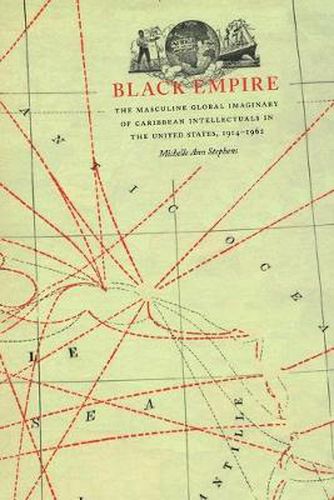Readings Newsletter
Become a Readings Member to make your shopping experience even easier.
Sign in or sign up for free!
You’re not far away from qualifying for FREE standard shipping within Australia
You’ve qualified for FREE standard shipping within Australia
The cart is loading…






In Black Empire, Michelle A. Stephens examines the ideal of transnational blackness that emerged in the work of radical black intellectuals from the British West Indies in the early twentieth century. Focusing on the writings of Marcus Garvey, Claude McKay, and C. L. R. James, Stephens shows how these thinkers developed ideas of a worldwide racial movement and federated global black political community that transcended the boundaries of nation-states. Stephens highlights key geopolitical and historical events that gave rise to these writers’ intellectual investment in new modes of black political self-determination. She describes their engagement with the fate of African Americans within the burgeoning U.S. empire, their disillusionment with the potential of post-World War I international organizations such as the League of Nations to acknowledge, much less improve, the material conditions of people of color around the world, and the inspiration they took from the Bolshevik Revolution, which offered a model of revolution and community not based on nationality. Stephens argues that the global black political consciousness she identifies was constituted by both radical and reactionary impulses. On the one hand, Garvey, McKay, and James saw freedom of movement as the basis of black trans-nationalism. The Caribbean archipelago–a geographic space ideally suited to the free movement of black subjects across national boundaries–became the metaphoric heart of their vision. On the other hand, these three writers were deeply influenced by the ideas of militarism, empire, and male sovereignty that shaped global political discourse in the early twentieth century. As such, their vision of transnational blackness excluded women’s political subjectivities. Drawing together insights from American, African American, Caribbean, and gender studies, Black Empireis a major contribution to ongoing conversations about nation and diaspora. Michelle A. Stephens is Assistant Professor of English, American studies, and African American studies at Mount Holyoke College.
$9.00 standard shipping within Australia
FREE standard shipping within Australia for orders over $100.00
Express & International shipping calculated at checkout
In Black Empire, Michelle A. Stephens examines the ideal of transnational blackness that emerged in the work of radical black intellectuals from the British West Indies in the early twentieth century. Focusing on the writings of Marcus Garvey, Claude McKay, and C. L. R. James, Stephens shows how these thinkers developed ideas of a worldwide racial movement and federated global black political community that transcended the boundaries of nation-states. Stephens highlights key geopolitical and historical events that gave rise to these writers’ intellectual investment in new modes of black political self-determination. She describes their engagement with the fate of African Americans within the burgeoning U.S. empire, their disillusionment with the potential of post-World War I international organizations such as the League of Nations to acknowledge, much less improve, the material conditions of people of color around the world, and the inspiration they took from the Bolshevik Revolution, which offered a model of revolution and community not based on nationality. Stephens argues that the global black political consciousness she identifies was constituted by both radical and reactionary impulses. On the one hand, Garvey, McKay, and James saw freedom of movement as the basis of black trans-nationalism. The Caribbean archipelago–a geographic space ideally suited to the free movement of black subjects across national boundaries–became the metaphoric heart of their vision. On the other hand, these three writers were deeply influenced by the ideas of militarism, empire, and male sovereignty that shaped global political discourse in the early twentieth century. As such, their vision of transnational blackness excluded women’s political subjectivities. Drawing together insights from American, African American, Caribbean, and gender studies, Black Empireis a major contribution to ongoing conversations about nation and diaspora. Michelle A. Stephens is Assistant Professor of English, American studies, and African American studies at Mount Holyoke College.